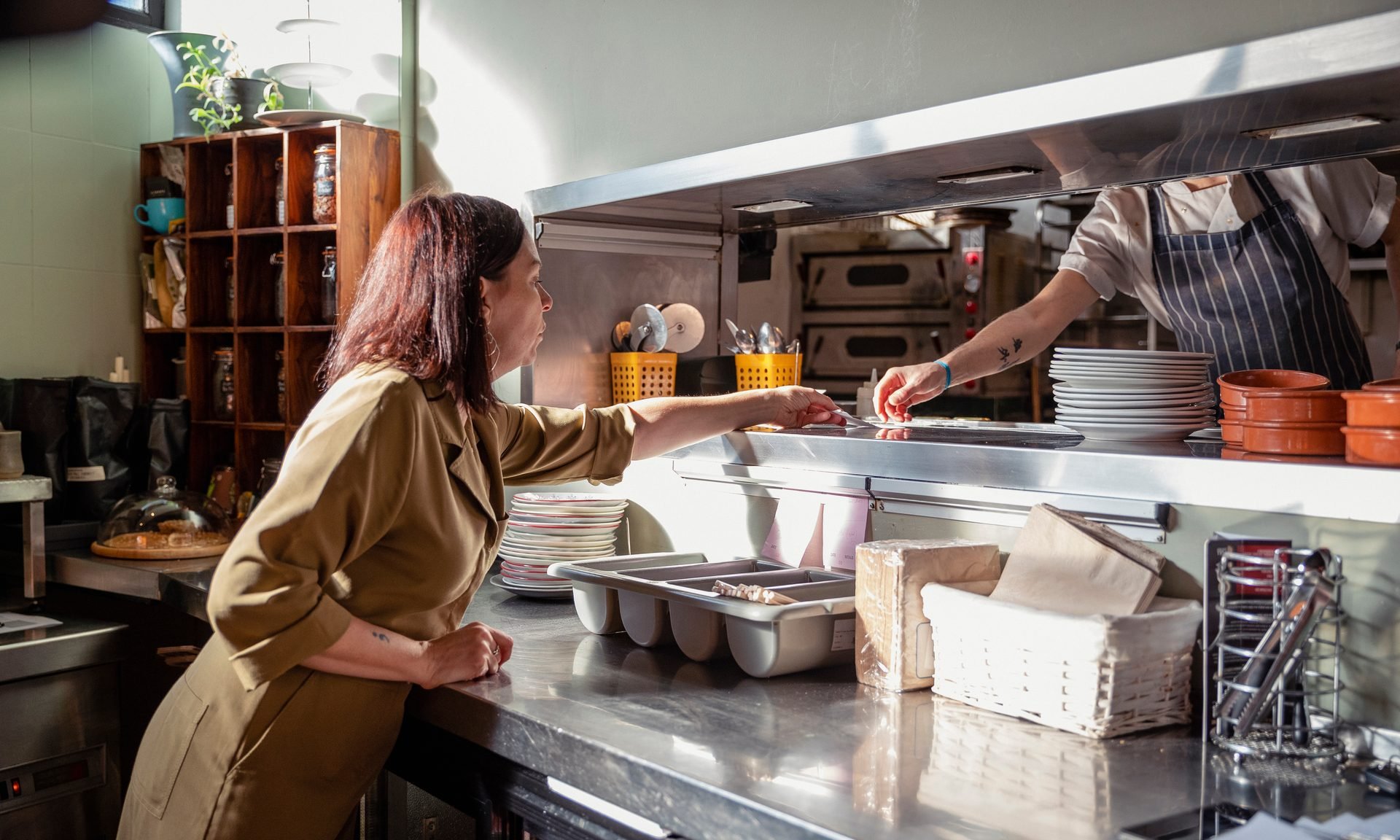How to Get Business Insurance for Restaurants and Food Companies
You can get food business insurance by contacting providers, using an online marketplace or working with a broker.

Many, or all, of the products featured on this page are from our advertising partners who compensate us when you take certain actions on our website or click to take an action on their website. However, this does not influence our evaluations. Our opinions are our own. Here is a list of our partners and here's how we make money.
To protect your restaurant or food business from lawsuits and other losses, you’ll likely need multiple types of business insurance. You can get restaurant or food business insurance online or over the phone, directly from an insurer or via a third party like a broker or marketplace.
Here are the kinds of small-business insurance that restaurants and food businesses should consider, as well as how to find the right coverage for you.

Save up to 30% on business insurance
NerdWallet Small Business helps you get real-time quotes from 30+ insurers, and instant access to your Certificate of Insurance (COI) through our partner, Coverdash.
1. Evaluate your risks
Before you start shopping for insurance for your restaurant or food business, evaluate the risks your company faces to understand your coverage needs.
In addition to common risks — like employee injury or loss of income — here are some examples of the industry-specific risks that restaurateurs and food-business owners face:
- Food spoilage and contamination.
- Grease fires.
- Customer intoxication (and any resulting actions).
- Broken or damaged equipment.
Think about what lawsuits, accidents or natural disasters might impact your business. Factors such as the size of your business, nature of your work, location, staff and assets will play a role in evaluating your risks.
» RELATED: Best loans for your restaurant
2. Determine your policy and coverage needs
The right insurance coverage will protect your food business or restaurant from both general and industry-specific risks. Here are some of the types of business insurance that may be applicable for businesses in the food and beverage space — and what these policies typically cover.
| Type of insurance | What it covers |
| Claims against your business in cases of third-party bodily injury, property damage and personal and advertising injury. A customer getting sick from your food and suing you would be covered under general liability. | |
| Commercial property insurance | Damage to your business property (building, assets, equipment) as the result of natural disasters, fire, smoke or vandalism. An electrical fire destroying your kitchen would be covered under commercial property insurance. |
| Loss of income when your business is unable to operate due to a disaster. Business interruption insurance would cover your lost income if you had to close your restaurant to repair the kitchen due to the damage from an electrical fire. | |
| Covers your employees if they are injured or get sick while at work. Most states require employers to have workers' comp for their employees. If an employee burns their arm in a kitchen accident, their medical expenses would be covered under workers' comp. | |
| Covers any vehicles you use in the course of doing business. Protects you from accident-related expenses that arise from injuries or property damage. If your delivery driver is rear-ended at a stoplight on the way to drop off an order, commercial auto insurance would cover damage to the car and any injuries the driver receives. | |
| Protects businesses that serve, sell or distribute alcohol. Covers claims of bodily injury or property damage that an intoxicated person causes after a business served them alcohol. If you serve a customer alcohol and they later start a fight and injure another customer, this type of insurance covers claims related to the incident. | |
| Protects your business in the case of a data breach or software hack. If hackers breach your computer system and steal your customers’ credit card information, this type of policy would cover the costs of notifying your customers, setting up credit monitoring and investigating the attack. | |
| Equipment breakdown insurance | Covers equipment breakdowns as a result of power surges, motor burnout, boiler malfunction and operator error. If an electrical issue causes your refrigerator fan to break and the appliance to stop working, this coverage can help cover the costs of purchasing a new one. |
| Employee dishonesty coverage | Protects your business in the case that an employee steals money or property. Can be part of a larger commercial crime insurance policy. If you discover an employee has been stealing cash from the register, this insurance can help cover those losses. |
» RELATED: Best restaurant equipment financing
You’ll likely need to purchase some of the more specialized types of coverage, like liquor liability insurance, as separate policies. Others might be available as endorsements on an existing policy. The Hartford, for example, allows you to add data breach coverage to your general liability policy.
You may also be able to bundle multiple types of insurance into a business owner's policy. BOPs usually consist of general liability, commercial property and business interruption insurance, but can be customized to meet your business’s needs.

Save up to 30% on business insurance
NerdWallet Small Business helps you get real-time quotes from 30+ insurers, and instant access to your Certificate of Insurance (COI) through our partner, Coverdash.
3. Choose how to shop
To shop for the right business insurance for your restaurant or food company, you have a few options:
Contact providers directly
You can purchase your food business insurance directly from an insurance provider and contact companies to get a business insurance quote based on your needs. Depending on the provider, you may be able to get a quote online or over the phone.
Good choice for you if:
- You already have a sense of the type of insurance your business needs.
- You want to get a quote and purchase a policy quickly.
- You don’t want to deal with a broker.
- You don’t have complex policy needs — e.g., you’re looking only to purchase a general liability policy or a BOP.
Possible downsides:
- It may be time-consuming to contact multiple providers for quotes, especially since not all providers offer the same types of business insurance and coverage.
- Although you can talk to a representative over the phone, you may not get the same level of assistance as you would working with a broker or independent agent.
Use an online marketplace
Business insurance marketplaces like CoverWallet and Simply Business streamline the shopping process. You can enter information about your company and the coverage that you’re looking for, receive quotes from different insurance providers and compare those quotes to find the best option for your business.
Many of these marketplaces give you the option to get a quote online or over the phone — and also provide customer support to discuss your coverage needs and help you through the process.
Good choice for you if:
- You want to manage the buying process on your own, but want to avoid the hassle of contacting multiple providers for quotes.
- You would like the option of talking to an expert to help you understand your insurance needs, walk you through the buying process or answer any questions you may have.
Possible downsides:
- Marketplaces partner with individual insurance providers, so you’ll receive quotes only from providers that the marketplace works with.
- Marketplaces don’t underwrite insurance policies themselves, and not all of these companies allow you to manage claims or post-purchase issues through their systems. You may find the communication between the different parties — you, the marketplace, the provider — isn’t always seamless.
Use a broker
An insurance broker can offer more personalized assistance in shopping for food business insurance. You’ll discuss your needs with the broker and they’ll get multiple quotes with coverage options from different providers. Then, you can compare and discuss the quotes in order to choose the right policy for your business.
Good choice for you if:
- You’re buying business insurance for the first time or are unsure of what types of coverage you need.
- You want to work directly with one person who can answer any questions you have, explain policy complexities and generally help you through the insurance buying process.
- You don’t want to spend time contacting providers yourself to get quotes.
Possible downsides:
- Because brokers work on commission, they might try to sell you additional policies or coverage that you don’t need. Make sure that any broker you work with is reputable, and is looking out for your interests first.
- Brokers are not obligated to find you the lowest rates for your policies.
- Some brokers charge an additional fee for their services.
- The process of shopping with a broker will likely be slower compared with using an online marketplace or contacting providers directly.
4. Compare providers
NerdWallet recommends getting multiple quotes from different providers before making a decision. When comparing providers, you’ll want to look at factors such as:
- Policy coverage: What exactly is covered under the policy? What isn’t covered? You’ll want to understand the policy details to make sure you’re getting the coverage your business needs.
- Limits of liability: How much of a loss will the insurance provider cover? For example, among Insureon customers, most food and beverage businesses choose general liability policies with a $1 million per-occurrence limit and a $2 million aggregate limit. Larger businesses or those at a higher risk level may need a higher limit.
- Price: How much will the policy cost? Is there a deductible on your policy — and if so, how much is it? When evaluating the costs of two different providers, you’ll want to try to make sure that the coverage and liability limits are the same so that it’s a more balanced comparison.
- Reviews: Check out the ratings and reviews of any insurance provider before purchasing a policy. You can see how many complaints have been filed against a company using the National Association of Insurance Commissioners website.
5. Buy your policies and keep them up to date
Once you’ve found the right policy and company, you can purchase your food business insurance. After you’ve purchased your policy, you’ll want to make sure you know when your payments are due, as well as how to manage your coverage — including taking actions like filing a claim, adding endorsements or requesting a certificate of insurance.
You’ll want to reevaluate the insurance coverage for your restaurant or food business on an annual basis. When your policy is up for renewal, think about your existing coverage, costs, customer service and any new risks you might be facing — such as opening a new location or hiring additional employees — to ensure that you still have the right policy for your business’s needs.
Article sources
NerdWallet writers are subject matter authorities who use primary,
trustworthy sources to inform their work, including peer-reviewed
studies, government websites, academic research and interviews with
industry experts. All content is fact-checked for accuracy, timeliness
and relevance. You can learn more about NerdWallet's high
standards for journalism by reading our
editorial guidelines.
Related articles





